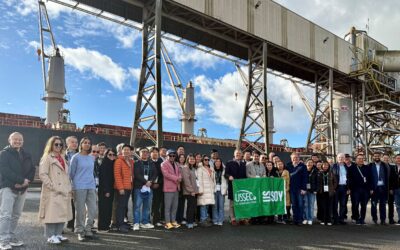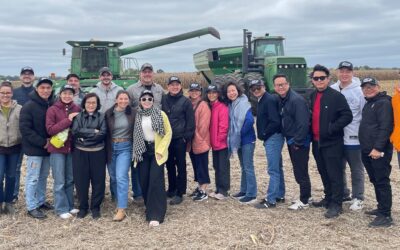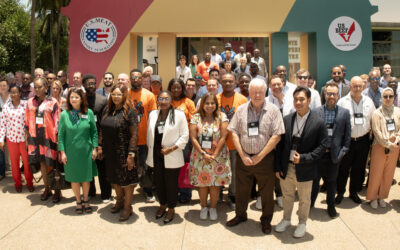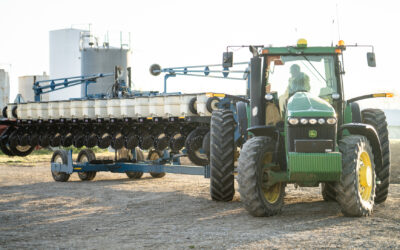Indianapolis Department of Public Works is newest B20 Club member
The B20 Club of Indiana, a collaboration between the Indiana Soybean Alliance (ISA) and the American Lung Association that recognizes and supports select Indiana-based fleets running on biodiesel blends of 20 percent or higher, recently welcomed the City of Indianapolis Department of Public Works (DPW) as its newest member.
Since September 2003, the City of Indianapolis DPW has been using biodiesel, a cleaner, renewable form of diesel fuel. Now, they have four B20 fuel sites and more than 1,500 of their vehicles run on biodiesel year-round.
“When we entered into an agreement with the State of Indiana to increase E85 and biodiesel usage nearly two decades ago, we purged all tank lines and filled them with B20,” said Bill Rogers, fleet administrator.

Larry Campbell, Director of Fleet Operations for the City of Fort Wayne, said many of the fleets that were up against for the Leading Fleet award don’t use biodiesel. Campbell believes using biodiesel is effective while being kinder to the earth and the community.
Since then, DPW has increased its biodiesel usage and championed the use of alternative fuels and technologies in its vehicles. “We’ve considered pretty much everything,” Rogers said. “B20 is our preferred fuel and is used in most of our trucks, but we also use liquefied petroleum gas (propane), E85, compressed natural gas and plug-in-hybridelectric vehicles.”
DPW’s use of biodiesel provides benefits to both Indy’s health and environment. Their use of B20 provides an estimated $1.7 million in annual health benefits and a carbon reduction equivalent to planting 27,211 trees every year.
“As a soybean farmer, we’re very excited about the potential of biodiesel,” said ISA Chair Jim Douglas, a farmer from Flat Rock, Ind. “Soybeans are a versatile crop with many uses. Each of these new uses adds value back to the farmer.The great thing about biodiesel is that it is a great product for the environment, and a great product for those who manage fleets of trucks, vessels and equipment operating on our roads, rails and waterways.”
The City of Indianapolis DPW was recently named a 2022 Leading Fleet by Government Fleet magazine, in part because of their commitment to sustainable fuels. This awards program, co-produced with the American Public Works Association and sponsored by Ford Pro, recognizes operations that are performing at a high level, particularly in fleet leadership, competitiveness and efficiency, planning and overcoming challenges. The City of Indianapolis also was selected and received the Greater Indiana Annual Clean Fleet Leader award for 2021.
DPW joins the B20 Club’s growing roster of members including the City of Fort Wayne and the Muncie Indiana Transit System. “We’re proud to be part of the B20 Club,” Rogers said. “They’re a great partner for us as we continue to champion sustainable fuels in the City of Indianapolis.”
Fort Wayne also a Leading Fleet
The City of Fort Wayne was also recently named a 2022 Leading Fleet by Government Fleet magazine. This awards program, co-produced with the American Public Works Association and sponsored by Ford Pro, recognizes operations that are performing at a high level, particularly in fleet leadership, competitiveness and efficiency, planning, and overcoming challenges.
“If you have your doubts about using biodiesel in your fleet, this is your sign to make the switch,” said Larry Campbell, Director of Fleet Operations at the City of Fort Wayne. “Many of the fleets we were up against for this award don’t use biodiesel which just goes to show you can run a fleet using biodiesel just as effectively while being kinder to the earth and the communities you run in.”
The City of Fort Wayne is a proud member of the B20 Club of Indiana.
“Making the switch to biodiesel isn’t difficult or costly,” said Campbell in the B20 Club’s new video series. “If you’re already doing a maintenance program on your fuel tanks, it’s a drop-in replacement for petroleum diesel. It’s simple to do and needs no costly modifications.”
Many of the fleets we were up against for this award don’t use biodiesel which just goes to show you can run a fleet using biodiesel just as effectively while being kinder to the earth and the communities you run in.
The city first started using biodiesel nearly two decades ago, and they now run 380 pieces of equipment on B20 – including fire trucks, snowplow trucks, specialist trucks such as sewer cleaners, sewer jetters, excavators, backhoes, pavers and all kinds of construction equipment.

Biodiesel boosts all of Indiana by reducing greenhouse gas emissions and improving air quality. It’s made from soybean oil and other renewable feedstocks produced in the state and lowers carbon footprints by reducing lifecycle carbon emissions. Biodiesel also improves air quality by drastically reducing particulate matter and other harmful vehicle emissions. B20 is a blend of 20-percent biodiesel and 80-percent conventional diesel.

Since September 2003, the City of Indianapolis DPW has been using biodiesel, a cleaner, renewable form of diesel fuel. Now, they have four B20 fuel sites and more than 1,500 of their vehicles run on biodiesel year-round.
In a little more than a year, the B20 Club of Indiana has made a calculable impact through:
- 865 vehicles fueled with B20
- 4.878 million gallons of B20 fuel used
- The equivalent of 138,408 trees planted
- 664 pounds of particulate matter reduced
- $322,160 in health savings “The benefits of B20 biodiesel are clear,” Helena Jette,
Director of Biofuels at the Indiana Soybean Alliance, said. “It is a crucial component of green fleet technologies that boost the performance of diesel vehicles and since it is produced locally from renewable resources, like sustainable soybean oil, B20 biodiesel helps support all of Indiana while reducing greenhouse gas emissions by as much as 80 percent compared to petroleum diesel.”

Larry Campbell, Director of Fleet Operations for the City of Fort Wayne, said many of the fleets that were up against for the Leading Fleet award don’t use biodiesel. Campbell believes using biodiesel is effective while being kinder to the earth and the community.
For more details about how B20 helps the City of Fort Wayne reach its operational goals, watch the B20 Club’s new video series at b20clubindiana.org/members/city-of-fort-wayne/.
Posted: November 3, 2022
Category: Indiana Corn and Soybean Post - Fall 2022, ISA




